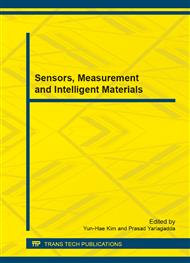[1]
Fu Lin, Huaqin Chen, Xinzheng Huang, Xueyou Yan. The theoretical analysis of the obstacles of Network information resource sharing[J]. Library and Information Service, 2006, 50(11): 60-63. (in Chinese).
Google Scholar
[2]
Jinbing Wang. The development history and the basic content of the game theory[J]. Era economic and trade, 2007, 5(70): 1-2. (in Chinese).
Google Scholar
[3]
Huijuan Cui, Haiyan Jin. The government information publicity: difficulties and causes[J]. Library Tribune. 2006, 26(3): 282-284. (in Chinese).
Google Scholar
[4]
Xiancheng Yang. Analysis of questions and countermeasures of the government information resources sharing[J]. Legal System and Society, 2007(4): 414-415. (in Chinese).
Google Scholar
[5]
M. Cioffi, P. Di Barba, A. Formisano,R. Martone. Pareto optima and Nash equilibria An effective approach to the shape design in electromagnetics [J]. COMPEL: The International Journal for Computation and Mathematics in Electrical and Electronic Engineering.
DOI: 10.1108/03321640810878252
Google Scholar
[6]
Jinlong Wang, Chunli Liu. Game theory: the new method of analyzing literature of information resources sharing[J]. Researches In Library Science, 2005(1): 17-19. (in Chinese).
Google Scholar
[7]
Peng Guo, Xiaoqin Yang. Game theory and Nash equilibrium[J]. Natural science journal of Harbin normal university 2006, 22(4): 25-28. (in Chinese).
Google Scholar
[8]
Chien-Ta Bruce Ho, Shih-Feng Hsu. Knowledge sharing: game and reasoned action perspectives[J]. Industrial Management & Data Systems., 2009, 109(9): 1211-1230.
DOI: 10.1108/02635570911002289
Google Scholar
[9]
Jinbing Wang. The development history and the basic content of the game theory[J]. Era economic and trade, 2007, 5(70): 1-2. (in Chinese).
Google Scholar
[10]
Yongli Liu. Analysis of logistics enterprise strategic alliance on game theory[J]. Science and technology information, 2008(34): 92-93. (in Chinese).
Google Scholar
[11]
Qiang Liu, Jiang Wu. Study of classification sharing way of the government information resources , 2004(10): 77-83. (in Chinese).
Google Scholar
[12]
Jian Guan. Talk about construction of government information sharing mechanism in our country. (in Chinese).
Google Scholar
[13]
Xueguang Zhou, Hong Lian. A analysis model of negotiation of between superior units and subordinate units insides the government department[J]. Chinese Social Science, 2011(5): 80-96. (in Chinese).
Google Scholar


